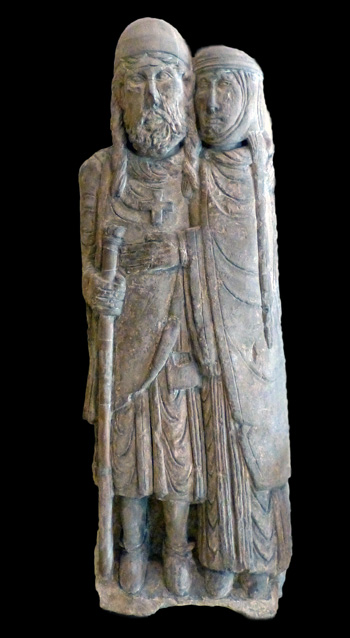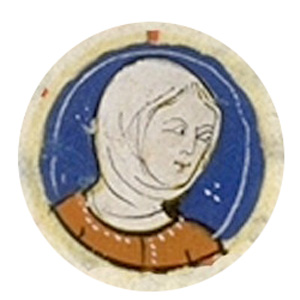World History
 |
 |
 |
 |
 |
 |
 |
Two Women Who Entered Crusading History
One of the most moving portrait of a woman that emerges from Crusading history is on a tombstone and not in the pages of a chronicle. A portrayal in the funerary chapel in the Church of Cordliers at Nancy, France, is surely one of the most touching of all 12th century sculptures that have survived.
 It depicts Count Hugh Baudémont and his wife Aigeline (Anne) of Burgundy and has been for centuries a symbol of
'The Crusader's Return.'
It depicts Count Hugh Baudémont and his wife Aigeline (Anne) of Burgundy and has been for centuries a symbol of
'The Crusader's Return.'
Hugh was a Crusader knight who accompanied King Louis VII of France during the Second Crusade. However, in this sculpture he is shown as a ragged Crusader in a pilgrim's cap and purse, which hangs beneath his surcoat. His shoes are worn out from his travels, and rags are bound around his legs. He holds a pilgrim's staff in one hand, and uses the other to embrace his wife.
Aigeline is shown with her right shoulder set beneath her husband's shoulder, indicating her submission to his protection and authority. Her right arm embraces his neck, while her left palm rests on his chest beneath the Crusader cross, acknowledging his dedication and fidelity to the Holy Faith.
The monument commemorates a long period of waiting. According to tradition, Hugh of Baudémont was held prisoner in the Holy Land for 16 years. When his death was reported, his wife Aigeline was urged to remarry but always firmly refused.
Finally, the man who was no longer expected came home. The sculpture captures the moment of his return from campaigning and his reunion with Aigeline. The image was made for the tomb of the couple where, some years later, the knight and the lady who had been faithful to each other all their lives were laid to rest side by side.
She saves his honor
The Siege of Antioch (1097-1098) was one of the most difficult episodes in the First Crusade. There were many desertions during the final two months of long Siege. One of those deserters was Count Stephen of Blois, married to the valiant Adela of Normandy, daughter of William the Conqueror.
 Count Stephen was one of the leaders of the First Crusade, leading one of the major armies of the Princes and often writing enthusiastic
letters to his wife Adela of Normandy about the
Crusade's progress. During the lengthy Siege of Antioch, the Count simply got fed up and went home.
Count Stephen was one of the leaders of the First Crusade, leading one of the major armies of the Princes and often writing enthusiastic
letters to his wife Adela of Normandy about the
Crusade's progress. During the lengthy Siege of Antioch, the Count simply got fed up and went home.
When he reached Blois he was greeted by a scene out of the chansons de geste. His wife, Adela, like Guibourc in the Chanson de Guillaume, piled such reproaches on his head that Stephen was shamed into going back to the Holy Land.
To restore his honor, he formed another army and returned with the second expedition in 1101. This time he completely fulfilled his vow to forge a way to Jerusalem, for he died fighting bravely against the Fātimids alongside King Baldwin I at the second Battle of Ramla on May 17, 1102.
And thus did Adela, daughter of William the Conqueror, enter the pages of Crusading History as a wife who did not welcome her Crusader husband on his return home.
Adapted from The Crusaders by Régine Pernoud,
Ignatius Press, 2003, pp. 78-79, 125;
Posted October 23, 2019

The 12th century memorial of the fidelity of a Crusader knight and his noble wife Aigeline of Burgundy
Hugh was a Crusader knight who accompanied King Louis VII of France during the Second Crusade. However, in this sculpture he is shown as a ragged Crusader in a pilgrim's cap and purse, which hangs beneath his surcoat. His shoes are worn out from his travels, and rags are bound around his legs. He holds a pilgrim's staff in one hand, and uses the other to embrace his wife.
Aigeline is shown with her right shoulder set beneath her husband's shoulder, indicating her submission to his protection and authority. Her right arm embraces his neck, while her left palm rests on his chest beneath the Crusader cross, acknowledging his dedication and fidelity to the Holy Faith.
The monument commemorates a long period of waiting. According to tradition, Hugh of Baudémont was held prisoner in the Holy Land for 16 years. When his death was reported, his wife Aigeline was urged to remarry but always firmly refused.
Finally, the man who was no longer expected came home. The sculpture captures the moment of his return from campaigning and his reunion with Aigeline. The image was made for the tomb of the couple where, some years later, the knight and the lady who had been faithful to each other all their lives were laid to rest side by side.
She saves his honor
The Siege of Antioch (1097-1098) was one of the most difficult episodes in the First Crusade. There were many desertions during the final two months of long Siege. One of those deserters was Count Stephen of Blois, married to the valiant Adela of Normandy, daughter of William the Conqueror.

Adela of Normandy: No welcome for her deserter Crusader husband
When he reached Blois he was greeted by a scene out of the chansons de geste. His wife, Adela, like Guibourc in the Chanson de Guillaume, piled such reproaches on his head that Stephen was shamed into going back to the Holy Land.
To restore his honor, he formed another army and returned with the second expedition in 1101. This time he completely fulfilled his vow to forge a way to Jerusalem, for he died fighting bravely against the Fātimids alongside King Baldwin I at the second Battle of Ramla on May 17, 1102.
And thus did Adela, daughter of William the Conqueror, enter the pages of Crusading History as a wife who did not welcome her Crusader husband on his return home.
Adapted from The Crusaders by Régine Pernoud,
Ignatius Press, 2003, pp. 78-79, 125;
Posted October 23, 2019
______________________
______________________
 Volume I |
 Volume II |
 Volume III |
 Volume IV |
 Volume V |
 Volume VI |
 Volume VII |
 Volume VIII |
 Volume IX |
 Volume X |
 Volume XI |
 Special Edition |